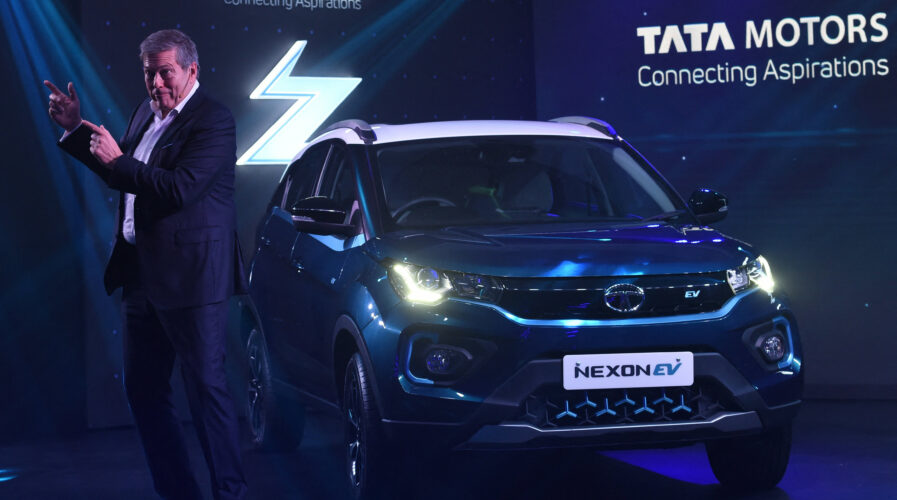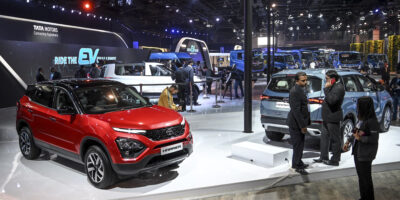
Tata Motors eyes for longer range EVs in two years. (Photo by INDRANIL MUKHERJEE / AFP)
Tata Motors eyes longer range EVs in two years
- Tata Motors wants to launch EVs including SUVs, using a new design which will allow for a larger battery and a range of up to 500 kilometers.
- Vehicles launched under its new Curvv design will be based on a new architecture adapted for electric models, according to Tata.
Tata Motors, which controls over 90% of India’s electric car market, is eyeing to launch longer range electric vehicles (EVs), including SUVs, within the next two years. Using a new Curvv design, the EVs will have larger batteries, with a range of up to 500 kilometers. To top it off, the automaker is also considering tapping into some of the export markets beyond South Asia.
The Curvv is part of the company’s product strategy to offer technologically superior EVs in terms of design, architecture and range. The company has adopted a three-step approach to introduce progressively advanced electric products to the customers, according to Tata Motors PVs and Electric Mobility MD Shailesh Chandra.
Basically, in its generation one models, Tata Motors had promised and delivered a certified range in excess of 250kms. For the upcoming generation two products, they are looking at a driving range of 400-500kms with fast charging option.
Although those EVs are expected to be launched in two years, Chandra said the company is working to fast track the development. “There will be room for a bigger battery and they will also be capable of faster and more efficient charging,” he added.
Tata Motors also sees an opportunity of selling affordable EVs in markets outside India, according to Business Standard. Chandra said the export plans will coincide with the commercial launch of the Curvv.
“We are actively thinking of the international markets and we would like to go with a portfolio of products. We have identified a few markets and in a couple of years, we should commence the same,” he added. The plan is to first address the right-hand markets and then extend it further to other markets.
However, the priority remains taking care of the backlog of orders for its EVs in the domestic market, Chandra said. On an average it has been selling close 1,600 units a month and has an order backlog of four to five months. In total, Tata Motors had sold 19,000 EVs in the fiscal year ended March 31, up 353% from 4,200 units the previous year.
The company was also impacted by the semiconductor shortage and could have sold more EVs if it weren’t for that. “The auto industry continued to witness rising demand in most segments even as the supply of semiconductors remained restricted resulting in adverse impact on production. The semiconductor supply situation is improving gradually whilst inflation worries persist,” ,” Tata Motors’ executive director Girish Wagh said in a statement.
Ever since Prime Minister Narendra Modi emphasized on the country’s goal to focus on the adoption of EVs, Tata Motors immediately made plans to increase the momentum in industry as well. The automaker’s goal is to launch several EVs in India that are expected to revolutionize the entire industry.
According to Reuters, Tata Motors will be investing over US$ 2 billion in its electric vehicle business over the next five years, after raising funds from private equity firm TPG. For Chandra, they aim to lead the electric vehicle charge in the market and work with investors to create a carbon-free world.
Interestingly, Tata’s plan has been, since the start, to launch electric cars with a larger battery pack than existing models. Most energy vehicles currently have a five to eight-year warranty on their battery. However, the current prediction is that an electric car battery will last from 10 to 20 years before they need to be replaced.
Tata’s upcoming cars could also include several new features to assist driving. Besides working on the upcoming electric four-wheelers, the group is also planning to add 10 electric vehicles to its portfolio by 2026.
Even Tesla, the world’s biggest electric carmaker, is preparing to launch its cars in India. Tesla has been lobbying with the Indian government to lower import duties on EVs as well. It is also the first major fundraising by an Indian carmaker to push clean mobility when global automakers such as General Motors, Volkswagen, and Toyota Motor are spending tens of billions of dollars to speed up EV adoption and also counter China’s dominance of the sector.
READ MORE
- Strategies for Democratizing GenAI
- The criticality of endpoint management in cybersecurity and operations
- Ethical AI: The renewed importance of safeguarding data and customer privacy in Generative AI applications
- How Japan balances AI-driven opportunities with cybersecurity needs
- Deploying SASE: Benchmarking your approach


